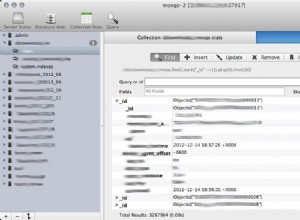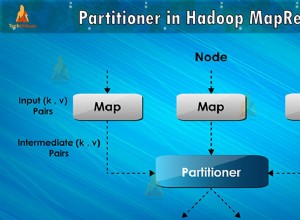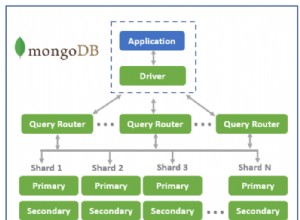Foi assim que acabei implementando o versionamento para entidades MongoDB. Obrigado à comunidade StackOverflow por ajudar!
- Um registro de alterações é mantido para cada entidade em uma coleção de histórico separada.
- Para evitar salvar muitos dados, a coleção de histórico não armazena instâncias completas, mas apenas a primeira versão e as diferenças entre as versões. (Você pode até mesmo omitir a primeira versão e reconstruir as versões "de trás para frente" da versão atual na coleção principal da entidade.)
- O Java Object Diff é usado para gerar diferenças de objeto.
- Para poder trabalhar com coleções corretamente, é preciso implementar o
equalsmétodo das entidades para que ele teste a chave primária do banco de dados e não as subpropriedades. (Caso contrário, JavaObjectDiff não reconhecerá alterações de propriedade em elementos de coleção.)
Aqui estão as entidades que eu uso para versionamento (getters/setters etc. removidos):
// This entity is stored once (1:1) per entity that is to be versioned
// in an own collection
public class MongoDiffHistoryEntry {
/* history id */
private String id;
/* reference to original entity */
private String objectId;
/* copy of original entity (first version) */
private Object originalObject;
/* differences collection */
private List<MongoDiffHistoryChange> differences;
/* delete flag */
private boolean deleted;
}
// changeset for a single version
public class MongoDiffHistoryChange {
private Date historyDate;
private List<MongoDiffHistoryChangeItem> items;
}
// a single property change
public class MongoDiffHistoryChangeItem {
/* path to changed property (PropertyPath) */
private String path;
/* change state (NEW, CHANGED, REMOVED etc.) */
private Node.State state;
/* original value (empty for NEW) */
private Object base;
/* new value (empty for REMOVED) */
private Object modified;
}
Aqui está a operação saveChangeHistory:
private void saveChangeHistory(Object working, Object base) {
assert working != null && base != null;
assert working.getClass().equals(base.getClass());
String baseId = ObjectUtil.getPrimaryKeyValue(base).toString();
String workingId = ObjectUtil.getPrimaryKeyValue(working).toString();
assert baseId != null && workingId != null && baseId.equals(workingId);
MongoDiffHistoryEntry entry = getObjectHistory(base.getClass(), baseId);
if (entry == null) {
//throw new RuntimeException("history not found: " + base.getClass().getName() + "#" + baseId);
logger.warn("history lost - create new base history record: {}#{}", base.getClass().getName(), baseId);
saveNewHistory(base);
saveHistory(working, base);
return;
}
final MongoDiffHistoryChange change = new MongoDiffHistoryChange();
change.setHistoryDate(new Date());
change.setItems(new ArrayList<MongoDiffHistoryChangeItem>());
ObjectDiffer differ = ObjectDifferFactory.getInstance();
Node root = differ.compare(working, base);
root.visit(new MongoDiffHistoryChangeVisitor(change, working, base));
if (entry.getDifferences() == null)
entry.setDifferences(new ArrayList<MongoDiffHistoryChange>());
entry.getDifferences().add(change);
mongoTemplate.save(entry, getHistoryCollectionName(working.getClass()));
}
É assim que fica no MongoDB:
{
"_id" : ObjectId("5040a9e73c75ad7e3590e538"),
"_class" : "MongoDiffHistoryEntry",
"objectId" : "5034c7a83c75c52dddcbd554",
"originalObject" : {
BLABLABLA, including sections collection etc.
},
"differences" : [{
"historyDate" : ISODate("2012-08-31T12:11:19.667Z"),
"items" : [{
"path" : "/sections[example@sqldat.com]",
"state" : "ADDED",
"modified" : {
"_class" : "LetterSection",
"_id" : ObjectId("5034c7a83c75c52dddcbd556"),
"letterId" : "5034c7a83c75c52dddcbd554",
"sectionIndex" : 2,
"stringContent" : "BLABLA",
"contentMimetype" : "text/plain",
"sectionConfiguration" : "BLUBB"
}
}, {
"path" : "/sections[example@sqldat.com]",
"state" : "REMOVED",
"base" : {
"_class" : "LetterSection",
"_id" : ObjectId("5034c7a83c75c52dddcbd556"),
"letterId" : "5034c7a83c75c52dddcbd554",
"sectionIndex" : 2,
"stringContent" : "BLABLABLA",
"contentMimetype" : "text/plain",
"sectionConfiguration" : "BLUBB"
}
}]
}, {
"historyDate" : ISODate("2012-08-31T13:15:32.574Z"),
"items" : [{
"path" : "/sections[example@sqldat.com]/stringContent",
"state" : "CHANGED",
"base" : "blub5",
"modified" : "blub6"
}]
},
}],
"deleted" : false
}
EDIT:Aqui está o código do visitante:
public class MongoDiffHistoryChangeVisitor implements Visitor {
private MongoDiffHistoryChange change;
private Object working;
private Object base;
public MongoDiffHistoryChangeVisitor(MongoDiffHistoryChange change, Object working, Object base) {
this.change = change;
this.working = working;
this.base = base;
}
public void accept(Node node, Visit visit) {
if (node.isRootNode() && !node.hasChanges() ||
node.hasChanges() && node.getChildren().isEmpty()) {
MongoDiffHistoryChangeItem diffItem = new MongoDiffHistoryChangeItem();
diffItem.setPath(node.getPropertyPath().toString());
diffItem.setState(node.getState());
if (node.getState() != State.UNTOUCHED) {
diffItem.setBase(node.canonicalGet(base));
diffItem.setModified(node.canonicalGet(working));
}
if (change.getItems() == null)
change.setItems(new ArrayList<MongoDiffHistoryChangeItem>());
change.getItems().add(diffItem);
}
}
}




